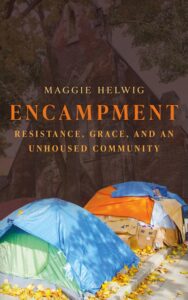May 16, 2025
Encampment, by Maggie Helwig
Maggie Helwig—Toronto poet and novelist, human rights activist, and also Anglican priest at St. Stephen-in-the-Fields in Kensington Market, just a few minutes walk from my house—isn’t preaching to the choir when I pick up her new book, Encampment: Resistance, Grace, and an Unhoused Community. It’s not politically fashionable in the circles in which I travel, but my feelings about homeless encampments have often been complicated and less than generous over the last five years. I know how I’m *supposed* to feel—the “I Support My Neighbours in Tents” signs that others installed on their front lawns signal that direction, but I have a hard time conjuring that support, sustaining it. It works in theory, I guess, but then I show up at the park with my kids and the people living in the tents along its perimeter start screaming at each other and it’s disturbing and frightening. And I have a hard time too with being told that my discomfort doesn’t matter, that my complicated feelings are morally dubious, and that the politics behind any of this are simple, that this is simply a case of rich homeowners versus everybody else, as encampments grow and those of us without our own backyards lose access to public parks and green spaces.
And what I appreciated about Encampment is that there was grace for that, for my complicated feelings and frustrations, just as there is grace for the people screaming in the park, and the people who’ve made their home in the encampment in the St. Stephen’s churchyard over the last few years, and so many others. Maggie Helwig’s capacity for grace is absolutely awe-inspiring, and I read Encampment wishing desperately that the world would give the woman a break. Her own challenges and struggles are woven into the text as well, which underlines just how much she needs a break, but also how her refusal to compartmentalize human experience—that of herself and of others—is where her compassion comes from. Humans are messy and hard. Community is messy and hard. Systems are broken, and what else can we do but try to love one another the best we can?
There is a woman in this book who might be me. (I suspect that, no matter who you are, you will see yourself in many of the people in this book.) That woman is a neighbour who stops Mother Maggie one chaotic day in the parking lot. She’s frustrated by some of the encampment residents, she is afraid of violence, but mostly she is angry because she never wanted to be somebody who turned against vulnerable people. And Helwig writes, “Because it is terrible, and it shouldn’t be like this, and coming up hard against the truth that we live in a society that will dump people like garbage on the side of the road, and there is no good thing we can do, is an awful moment for anyone who hasn’t been through it yet.”
Those of us who live in a world where people are well and housed and healthy and stable have no inkling of what life is like for those beyond those limits, and Encampment rectifies that, explaining away the myths of homelessness, dismissing easy solutions—couldn’t they just…? If only…? The most powerful part of the book for me was when Helwig writes about stuff, possessions: “Maybe this is a good time to talk about the relationship that people have with things, and how far it is really just an inflection of our whole society’s relationship with things.”
And it’s this refusal to see any difference between neighbours, regardless of their housing, that makes Helwig’s voice and vision so extraordinary, and what makes Encampment such a necessary, clarifying, and life-changing read for so many of us right now. Some of the most frightening characters in the book are people with six figure incomes and roofs over their heads, not the guy unconscious in the doorway. Helwig writes, “The true, terrible threat is that, if you just one let these people get too close, you might learn that, underneath it all, we actually are the same. Poor bare forked animals in King Lear’s storm, in a world that’s always ending.”







Thanks for this, Kerry. I could use an eye-opener when it comes to the circumstances leading to and prolonging homelessness, but I like how you’ve articulated your honest response to it in your own neighbourhood.